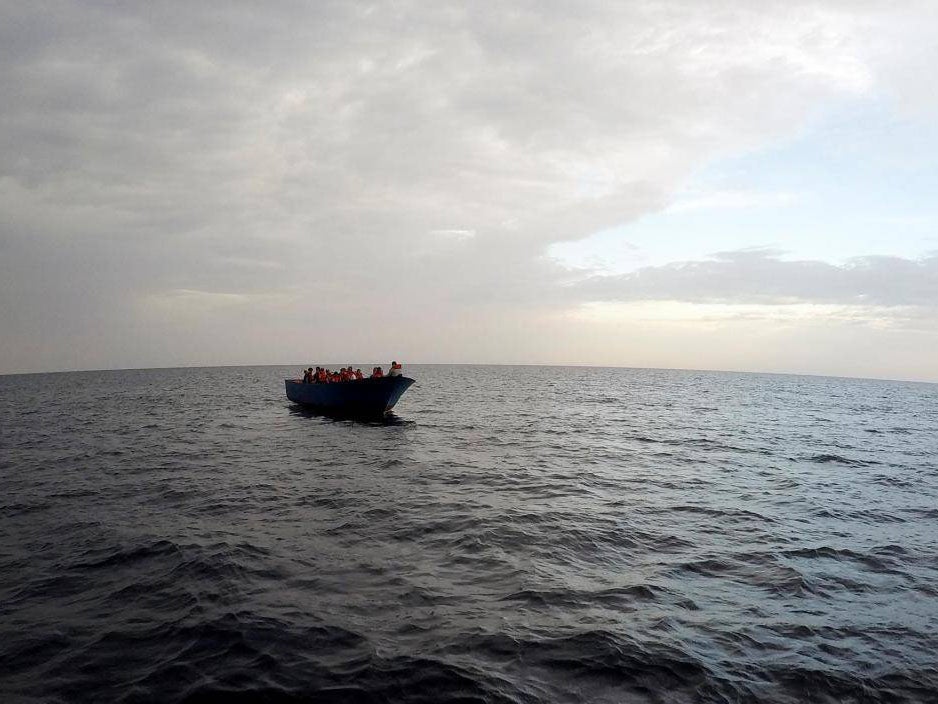At least 90 refugees feared drowned after boat capsizes off coast of Libya
Survivors tell aid workers majority of victims were from Pakistan

Your support helps us to tell the story
From reproductive rights to climate change to Big Tech, The Independent is on the ground when the story is developing. Whether it's investigating the financials of Elon Musk's pro-Trump PAC or producing our latest documentary, 'The A Word', which shines a light on the American women fighting for reproductive rights, we know how important it is to parse out the facts from the messaging.
At such a critical moment in US history, we need reporters on the ground. Your donation allows us to keep sending journalists to speak to both sides of the story.
The Independent is trusted by Americans across the entire political spectrum. And unlike many other quality news outlets, we choose not to lock Americans out of our reporting and analysis with paywalls. We believe quality journalism should be available to everyone, paid for by those who can afford it.
Your support makes all the difference.At least 90 refugees are feared drowned after a boat capsized off the coast of Libya, according to the UN International Organisation of Migration (IOM).
There were just three known survivors, who told aid workers that most of the victims were Pakistani.
“They have given an estimate of 90 who drowned during the capsize, but we still have to verify the exact number of people who lost their lives during the tragedy,” said Olivia Headon, a spokesperson for the UN migration agency.
Security officials in Zurawa in western Libya, said two Libyans and one Pakistani had been rescued from the boat.
“We are told that two survivors swam to shore, and one person was rescued by a fishing boat,” Ms Headon said, speaking from Tunisia’s capital.
“We are working to get more details on the [capsizing] and where the survivors are so that we can assist them better.”
Early investigations suggest the boat had become unbalanced and capsized, Ms Headon said.
More than a dozen bodies washed up on the shore earlier on Friday, and Pakistan’s foreign ministry said it had confirmed the deaths of 11 of its citizens in the sinking.
Spokesperson Mohammad Faisal said diplomats from the country’s embassy had arrived on the coast of Libya to collect more details, and efforts would be made to repatriate the bodies.
Mr Faisal questioned the IOM’s statement, based on reports from its partner agencies, that most of those who drowned were of Pakistani nationality.
Another IOM spokesperson, Leonard Doyle, told the Reuters news agency that the smugglers’ boat was believed to have left Libya at Zuwara on Thursday, capsizing at sea early on Friday morning.
The town of Zuwara, near Libya’s border with Tunisia, was a popular site for boat departures at the height of the Mediterranean migration crisis, but has seen fewer boats in recent months as Libya’s coastguard has stepped up efforts to block their passage.
Libya to Italy is nonetheless still the main migrant route into Europe by sea, accounting for around two thirds of crossings. Prior to Friday’s incident, the IOM said, more than 6,600 people had attempted Mediterranean sea crossings and a further 246 had died.
Ms Headon said Pakistani nationals make up an growing proportion of those trying to make the perilous crossing. In January, Pakistani was the third most common nationality attempting the route, up from 13th across 2017.
Ms Headon said the reason for the increasing flow of Pakistanis wasn’t immediately clear, and that the UN does not know whether the greater influx is likely to continue. “We’re looking into it,” she said.
More than 600,000 people are believed to have made the journey from Libya to Italy over the past four years, despite a dip after the crackdown which began in July last year.
The recipient of EU training and funding, Libya’s coastguard has been under pressure from Europe and from Italy in particular to be more assertive in cracking down on the number of crossings.
Rights groups say the policy means refugees’ lives are being put at risk, and those who are returned to Libya are put in severely overcrowded detention centres. Human Rights Watch says those who do end up stuck in Libya, particularly migrants from elsewhere in Africa, are often subject to extreme hardship, abuse and forced labour.
Additional reporting by agencies
Join our commenting forum
Join thought-provoking conversations, follow other Independent readers and see their replies
Comments